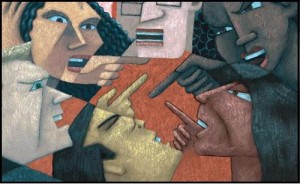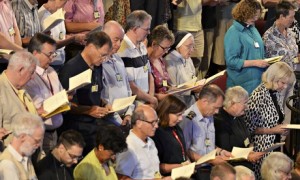
A stranger from a distant locale may be received as a guest for as long as he desires providing he does not make unreasonable demands but accepts the ways of the brothers and is satisfied.
Where is the sacrifice?
A friend of mine has recently done some research on theological education in the UK. The research aimed to uncover the reasons behind a person’s selection of one theological training institution over another. My friend has not finished writing up the findings but they were struck by how the primary motivation for selection was personal preference.
That may not seem, on the face of it, a shock,
Of course, it’s down to their personal preference!
Personal preference always plays some part in any decision but when this is the primary reason we may be in trouble. Personal preference is now outranking God’s call along with the potential cost that that call may have on one’s life. The responses may well assume that ‘personal preference’ means God’s will but that is even more dangerous and leads me to some thing I’d like to briefly explore again.
Our current culture is so individualised that we have again committed the heresy of assuming too much that God is made in our image and not the other way round. Every generation is tempted to commit this error in different ways; ours has fallen for it in the way we interpret Scripture and discern the will of God. In our heady mix of neoliberalism and libertarian morals alongside the deeply ingrained consumerism we have arrived at the place where our primary authority in discernment is personal, private emotions.
I know God and He loves me just the way I am and He wants me to be happy. He’s not clearly saying “no” to this behaviour and it makes me happy so it must be ok.
This subjective authority is of no use in a functioning society. Yes, the heart is important but, as Jesus himself said,
”For it is from within, from the human heart, that evil intentions come: fornication, theft, murder, adultery, avarice, wickedness, deceit, licentiousness, envy, slander, pride, folly. All these evil things come from within, and they defile a person.” (Mark 7:21-23)
We are capable of great love but we are also capable of great evil and discerning the two is not as easy as we assume. Love can be contaminated with these evil intentions. We have this arrogance to think that we know what love is but we limit it and we make out it is easy to love. Jesus showed us that great love has a great cost and the way to be like Jesus is narrow.
Where is the talk of radical, costly discipleship? Where is the conversation about the narrow road, the immediately exclusive way in Jesus spoke about this path of transformation? Consumer culture has infected Christ’s body and we need to deal with it. God can easily be thought of as blessing us with everything we want and our faith crumbles when things don’t go our way. We act however we like and we all search the Bible to justify our actions. We freely choose to behave in ways that seem perfectly reasonable and we judge them to be right by the happiness factor.
In a very banal way, consider church hopping.
I’m not against searching out a local congregation that will feed and encourage us. The style of worship has a part to play in whether you are called there, as is theological roots and tradition. You don’t want to be in a place where you are always frustrated and tempted to moan and grumble about that group of people. This desire to fit in though must be held in tension with God’s work in you.
I chose to go to Cranmer Hall in Durham not primarily because the people were nice, or it was closer to family but primarily because I felt God calling me to train in the difficult, urban communities of working class people very different from my experience. I visited Ridley Hall in Cambridge and it was great. I could have trained there and I would have learnt a lot and would have loved the people I trained with but the swinging factor was I felt God asking me to step out of my comfort zone and stretch myself. That was scary but my wife and I trusted that God would grow and change us and ultimately surprise us with what he can do through us.
I feel God is challenging His Church to readdress the question of commitment. I think there is a great move of the Spirit towards an acknowledgement of ‘costly grace’ and I don’t think any of us really knows what that looks or feels like but I can assure you that it won’t be comfortable.
Rowan Williams, in his book ‘The Wound of Knowledge’, says,
Humanity is created in God’s image – created with the capacity for relationship to God in obedience: its fulfilment is in this relationship…But the image is potential only, it must be made into a ‘likeness’ by the exercise of goodness. Had humanity been created in perfection, it would have performed its good acts automatically. (Rowan Williams, The Wound of Knowledge (London: Darton, Longman and Todd, 1990) p.27-28)
The Anglican Church adopts a three fold authority structure to guard against mis-guided discernment: Scripture, tradition and reason. All three must play a part in the discernment process. This is why discerning moral responses to issues takes time because all three must be held in tension. In our current age we have, at times, thrown all three out of the window and adopted the authority of this world, private happiness.
Although it is not obvious, St. Benedict is talking about discernment in this week’s chapter. He talks about how a visiting monk should point out things he thinks are wrong and how the abbot should respond.
If he thinks something wrong and points it out humbly, charitably and judiciously, the abbot should circumspectly meditate upon it, for the Lord may have sent the stranger for that purpose.
Humility, love and wisdom. These should be our desires for ourselves. What does it mean to pray for humility? What does it mean to be loving? What does it mean to be wise? All of them are life-long journeys of discovery and our prayer should always be that God works these things through us and all of them will require that we change who we are.
Reflection
There has been a really interesting report out this week from the Centre for Theology and Communities entitled ‘Deep Calls to Deep: monasticism for the cities’. In it they have explored monastic expressions from various traditions in East London. At the end of the interviews they share the following suggestion,
The stories in this report are challenging to our urban consumer culture. They are stories of people prepared to commit to something for life, living together in community, willing to forgo and to share money for the benefit of others, devoting their careers to pursuit of the Common Good. (Tim Thorlby and Angus Ritchie, Deep Calls To Deep: monasticism for the cities (London: Centre for Theology and Communities, 2015) p.43)
The reason I would argue that the New Monastic movement is an evangelistic and missional movement is because of this direct challenge to our culture at this time. I see many people proclaiming Jesus Christ as Lord and coming to Church but there is little focus on the conversion, the turning away from a previous life.
I guess Shane Claiborne says it best,
We are cultural refugees. The beautiful monastics throughout church history were cultural refugees; they ran to the desert not to flee from the world but to save the world from itself… Much of the world now lies in ruins of triumphant and militant Christianity. The imperially baptized religion created a domesticated version of Christianity – a dangerous thing that can inoculate people from ever experiencing true faith. (Everyone is a Christian, but no one knows what a Christian is anymore.) Our hope is that the postmodern, post-Christian world is once again ready for a people who are peculiar, people who spend their energy creating a culture of contrast rather than a culture of relevancy. (Shane Claiborne, Jesus for President: politics for ordinary radicals (Michigan: Zondervan, 2008) p. 238-240)
The New Monastic movement is, I feel, taking an interesting turn in the UK towards a parish focus. This parish focus reintroduces sacrifice into a movement that could have been seen as pic and mix spirituality. With an emphasis on location the new monastics are called to even deeper obedience and commitment that counters that consumerism that is ingrained in all of us. With the emphasis on committing to a particular community and a particular area, no matter how hostile or challenging, the new monastics are bringing the contrast of the disciplined life into the heart of a culture and changing it. The new monastics are living in exile in the midst of an alien culture and living an alternative lifestyle.
Loving Father, you are unchanging and steadfast but we are not. We thank you that the path of transformation is open to us and that we can change. Guide us by your grace and your Holy Spirit that we would be transformed into the likeness of your Son, Jesus Christ. May we grow to be steadfast in our commitment to you, that we would be more and more faithful disciples, humbly loving the world and seeking to establish your kingdom here amongst us.
Come, Lord Jesus.
 Who has the right to the land of Gaza and the West Bank? We could start by going into all the history and legalities over this issue. The use of words such as ownership can then be brought into question. Historical facts could then be muddied by interpretation of events and phrasings and then there’s the insurmountable obstacle of personal stories and the tangled web of historical violence from both sides.
Who has the right to the land of Gaza and the West Bank? We could start by going into all the history and legalities over this issue. The use of words such as ownership can then be brought into question. Historical facts could then be muddied by interpretation of events and phrasings and then there’s the insurmountable obstacle of personal stories and the tangled web of historical violence from both sides. Winning arguments is easy if you can just wear down your opponent and the easiest way to do that is keep moving the goal posts; re-define the terms of the argument until it gets too complicated and they get confused and worn out. You don’t need truth to do this; all you need is stamina and intelligence.
Winning arguments is easy if you can just wear down your opponent and the easiest way to do that is keep moving the goal posts; re-define the terms of the argument until it gets too complicated and they get confused and worn out. You don’t need truth to do this; all you need is stamina and intelligence. In November 2012 General Synod’s motion to vote female bishops failed, only just but enough. What was clear back then was that the debate had been established on the principle that there was an ‘us’ vs. ‘them’. The aim was not to discover wisdom but to ‘win’ at any cost. Both parties on the extremes didn’t seem to care how they would win just as long as they did. This week, however, the tone of the debate was not on winning points and persuasion but a genuine, heartfelt desire to seek wisdom and to trust one another. The debate stopped being about party politics but more about seeking genuine peace and wisdom only found in the Spirit of God.
In November 2012 General Synod’s motion to vote female bishops failed, only just but enough. What was clear back then was that the debate had been established on the principle that there was an ‘us’ vs. ‘them’. The aim was not to discover wisdom but to ‘win’ at any cost. Both parties on the extremes didn’t seem to care how they would win just as long as they did. This week, however, the tone of the debate was not on winning points and persuasion but a genuine, heartfelt desire to seek wisdom and to trust one another. The debate stopped being about party politics but more about seeking genuine peace and wisdom only found in the Spirit of God. To dismantle such a fence of division takes time, building trust and relationship something sadly lacking in our politics in this country. My very public critique of the Same Sex Marriage Bill was not based on some personal, moral judgement on homosexuality but on the way a decision was being sought. It was rushed. The lobbyists pressured opponents with the supposed lack of time and bullied people into making a response; to choose a side of the fence. Rather than taking the fences down they were happy to keep them there. People were forced off the fence onto one side or the other and it was all done by the manipulation of language. The same is being done with The Assisted Dying Bill.
To dismantle such a fence of division takes time, building trust and relationship something sadly lacking in our politics in this country. My very public critique of the Same Sex Marriage Bill was not based on some personal, moral judgement on homosexuality but on the way a decision was being sought. It was rushed. The lobbyists pressured opponents with the supposed lack of time and bullied people into making a response; to choose a side of the fence. Rather than taking the fences down they were happy to keep them there. People were forced off the fence onto one side or the other and it was all done by the manipulation of language. The same is being done with The Assisted Dying Bill.